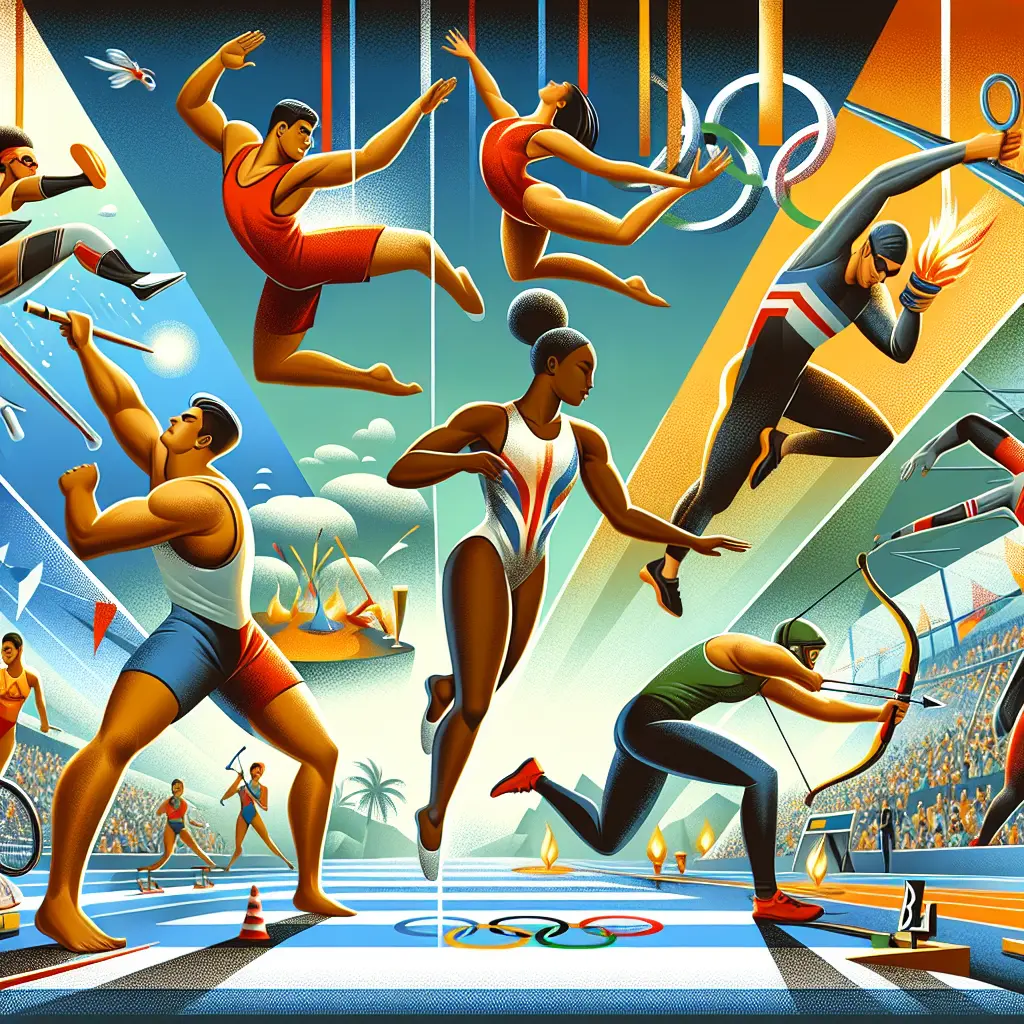In the grand arena of the Olympic Games, where the spirit of competition meets the pinnacle of human achievement, certain Olympic athletes have left an indelible mark on the world through their unparalleled sportsmanship. These legendary Olympians have not only transformed sportsmanship but also redefined what it means to be both a competitor and a role model. From the historic Olympic events that brought us iconic Olympic moments to the celebrated Olympians who exemplified grace and humility, the stories of these world-renowned athletes inspire generations. Their memorable Olympic performances are not merely tales of victory or defeat but are lessons in humanity that highlight the best sportsmanship in Olympics history.
Olympic sports legends, such as Jesse Owens, who defied odds and prejudice, and Cathy Freeman, who ran for unity and reconciliation, are more than just famous Olympic athletes—they are Olympic heroes whose influence transcends the games themselves. These inspiring Olympians have become influential Olympic figures whose legacy continues to resonate within the hearts of fans and aspiring athletes alike. Their exemplary conduct stands as a beacon for sportsmanship in Olympics, proving that true greatness lies not just in athletic prowess but in character and integrity.
As we delve into the captivating Olympic sportsmanship stories that celebrate these transformative figures, we uncover how their actions have elevated the ethos of sportsmanship in unprecedented ways. Join us as we explore the lives and legacies of these top Olympic athletes, whose contributions have not only enriched Olympic legacy but also continue to inspire new generations to emulate their example.
Olympic Athletes Who Transformed Sportsmanship
The world of the Olympics is more than just a showcase of physical prowess and competition. It's a stage where the finest qualities of humanity—courage, determination, and above all, sportsmanship—are put on display for millions to witness. Through the decades, many Olympic athletes have transcended their sport to become symbols of these virtues, transforming sportsmanship in unprecedented ways.
The Timeless Legacy of Jesse Owens
Jesse Owens remains one of the greatest Olympic athletes, whose achievements continue to inspire athletes across generations. During the 1936 Berlin Olympics, amidst a politically charged atmosphere and racial discrimination, Owens showcased exceptional sportsmanship. He won four gold medals, defying the Aryan supremacy narrative promoted by Nazi Germany. Owens' humility and grace under pressure stand as iconic Olympic moments that reshaped perceptions worldwide. His legacy is celebrated not just for his victories but for the profound impact he had on sportsmanship in Olympics history.
Cathy Freeman: Running for Reconciliation
Cathy Freeman is another legendary Olympian whose influence extends far beyond her athletic accomplishments. At the Sydney 2000 Olympics, Freeman ran the 400 meters in front of a home crowd, symbolizing unity and reconciliation for Australia’s Indigenous population. Her victory was more than a personal triumph; it was a historic Olympic event that highlighted her as an inspiring Olympian and influential Olympic figure. Freeman's journey reflects how sports can serve as a powerful platform for social change and reconciliation.
The Resilient Spirit of Simone Biles
Unforgettable Acts of Sportsmanship
More recently, Simone Biles has emerged as a modern icon of sportsmanship and resilience. Known for her extraordinary talent in gymnastics, Biles faced significant challenges during the Tokyo 2020 Olympics (held in 2021 due to the pandemic). Opting out of several events to prioritize her mental health, Biles' decision was a defining moment in sportsmanship in Olympics. It sparked global conversations about mental health and athlete well-being, proving that sportsmanship includes knowing when to step back for one's own health—a lesson in humanity that resonates with fans worldwide. Learn more about Simone Biles’ impact.
Throughout Olympic history, there have been numerous instances where world-renowned athletes exhibited unparalleled sportsmanship:
Luz Long and Jesse Owens (1936): German long jumper Luz Long gave technical advice to Jesse Owens, his competitor, helping him qualify for the finals. This act is celebrated as one of the best sportsmanship moments in Olympic history, emphasizing friendship over rivalry.
Lawrence Lemieux (1988): In the Seoul Olympics, Canadian sailor Lawrence Lemieux was positioned to win a silver medal but chose to abandon his race to rescue fellow competitors from Singapore who had capsized. His selflessness earned him the Pierre de Coubertin medal for sportsmanship.
Abbey D'Agostino and Nikki Hamblin (2016): During a women's 5000m heat at the Rio Olympics, D'Agostino and Hamblin collided. Despite injury, they helped each other finish the race, showcasing true Olympic sportsmanship and camaraderie.
The Evolution of Sportsmanship: Modern Perspectives
In recent years, the concept of sportsmanship has evolved, encompassing not only behavior on the field but also actions off it. Social media and global connectivity have amplified the voices of athletes who stand up against injustice and advocate for equality and mental health awareness.
The Role of Technology in Promoting Sportsmanship
Technology has played a crucial role in highlighting stories of celebrated Olympians and their remarkable acts of sportsmanship. Platforms like Twitter and Instagram provide athletes with a direct line to fans, allowing them to share personal experiences and advocate for causes they believe in. This interaction humanizes famous Olympic athletes, making them accessible role models for aspiring young athletes.
Tom Daley’s Advocacy: British diver Tom Daley has used his platform to advocate for LGBTQ+ rights. His public persona transcends his diving achievements, making him an influential Olympic figure known for his advocacy as much as his athletic prowess. Explore Tom Daley’s advocacy work.
Women in Sports: Redefining Norms
The past decade has seen an unprecedented rise in female athletes taking center stage not just for their performances but also for their roles as sportsmanship role models. Women like Allyson Felix have become synonymous with perseverance and advocacy for maternity rights in athletics.
Allyson Felix’s Advocacy: Felix's decision to part ways with Nike over maternity leave policies highlighted issues faced by female athletes. Her actions have contributed significantly to creating a more equitable environment in sports.
The Ongoing Legacy of Olympic Sportsmanship
As we continue to celebrate these top Olympic athletes and their contributions to the Olympic legacy, we are reminded that true greatness lies not just in winning medals but in embodying values that uplift humanity. These Olympic heroes demonstrate that memorable Olympic performances are defined by character, integrity, and the unwavering spirit of sportsmanship.
In exploring these Olympic sportsmanship stories, we not only honor past achievements but also pave the way for future generations to uphold these ideals—ensuring that the essence of the Olympics remains as vibrant today as it was at its inception.
In reflecting on the transformative power of sportsmanship at the Olympics, we recognize that true greatness extends beyond physical achievements. These Olympic athletes have become icons, not just for their victories, but for their embodiment of sportsmanship and humanity.
- Jesse Owens demonstrated humility and grace amidst adversity, forever altering perceptions of sportsmanship.
- Cathy Freeman symbolized unity and reconciliation, using her platform to advocate for social change.
- Simone Biles prioritized mental health, sparking crucial conversations about athlete well-being.
- Unforgettable acts like those by Luz Long, Lawrence Lemieux, and the partnership between Abbey D'Agostino and Nikki Hamblin highlight the essence of camaraderie and selflessness.
- The evolution of sportsmanship now includes advocacy and activism, as seen in Tom Daley’s fight for LGBTQ+ rights and Allyson Felix’s stance on maternity rights.
These stories remind us that the legacy of the Olympics lies in the values that uplift humanity: courage, integrity, and compassion. They encourage us to look beyond medals to the enduring impact these athletes have made in promoting equality, mental health awareness, and social justice.
As we celebrate these remarkable individuals, let's reflect on how we can embody these principles in our own lives. Share your thoughts or experiences with sportsmanship in the comments below—how have these stories inspired you? Together, let's continue to uphold the spirit of the Olympics, fostering a community grounded in mutual respect and support.






Leave a Comment